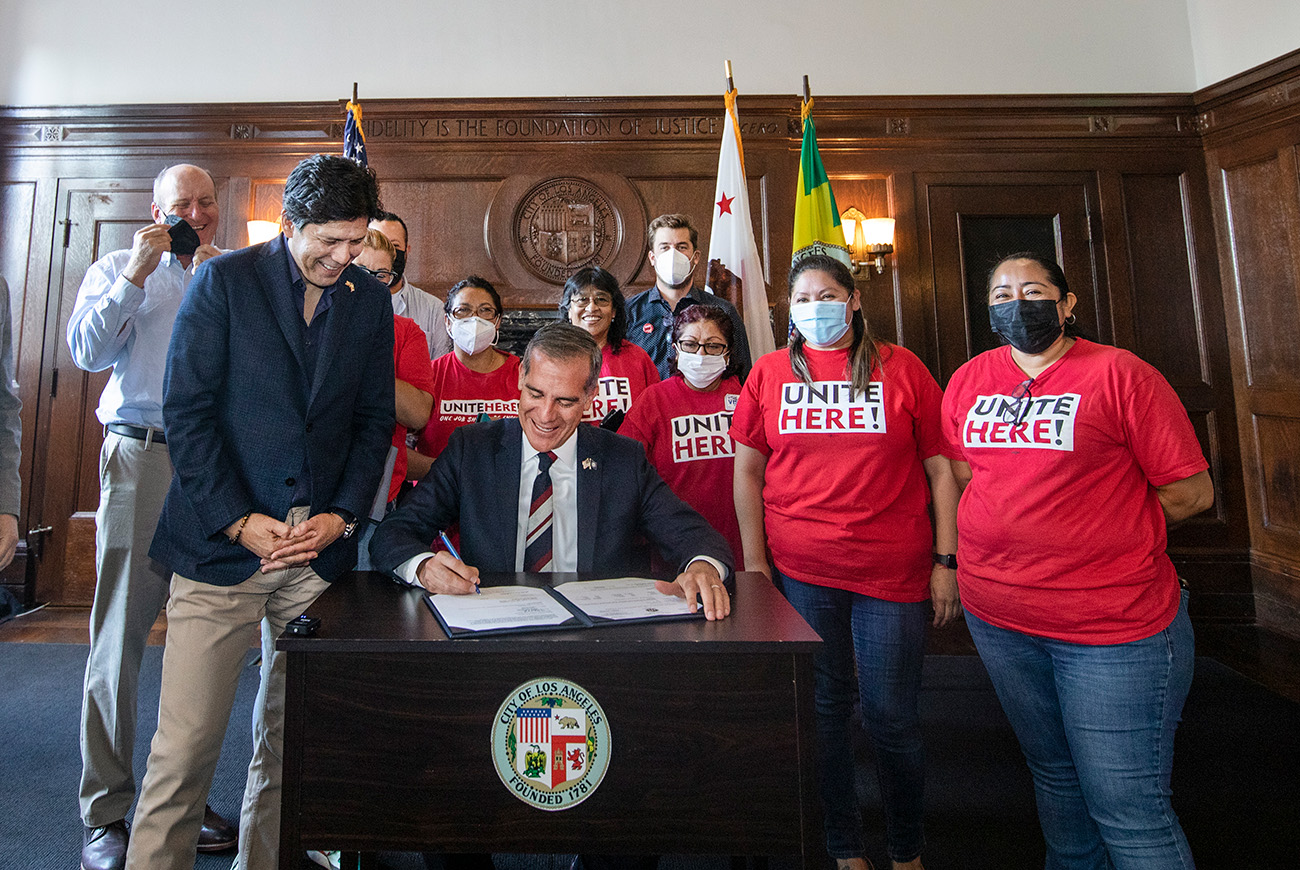State of Inequality
‘You Just Can’t Devastate the Working Poor’
Los Angeles City Councilmember Kevin de León discusses new gains for some of the most invisible workers in town.

Last month, the Los Angeles City Council passed an ordinance that institutionalizes several hotel worker protection measures: limits on how much square footage workers can be required to clean in a day; safety precautions against sexual harassment; overtime provisions; and the end of the hotel industry’s “opt-in” policy on daily room cleaning.
Taken together, the measures constitute a significant step forward for hotel workers’ rights. The ordinance passed on a direct vote by the council, which chose to bypass a ballot referendum in November and put the new requirements into effect almost immediately.
Kevin de León, who represents the 14th District on the council, championed the measure, saying, “Our city’s economy is built around the service industry, and hotel workers are the city’s backbone.” De León recently spoke with Capital & Main about his motivation for supporting the ordinance — and about local government’s increasing responsibility to monitor worker protection rules.
This interview has been edited for length and clarity.
Capital & Main: What prompted you to get behind this?
Kevin de León: We have dealt with earthquakes and wildfires, civil unrest and severe economic recessions, but we had never in our lifetime dealt with a global pandemic that brought us to our knees economically. And what happened to the hotel workers was in fact catastrophic, because they had upwards of 90%, 95% unemployment. Many of them live in areas that were epicenters, ground zeroes for both the pandemic and mortality rates. So I think that’s why it was really critical that we do everything within our power to ensure that these working men and women, primarily women, who have helped build this economy are protected.
You have a personal connection to the idea too, though, right?
Yes, my mother. My mother worked her fingers to the bone when I was growing up. She was primarily a housekeeper, but she also worked in hotels, and she struggled to make ends meet and pay the rent and put food on the table for me. And many of these workers remind me, quite frankly, of my mother. They are the salt of the earth. The work they do is really, really hard. And they deserve protection.
There is also the notion of creating an atmosphere in which they can do something more than just survive.
We need to create a pathway to the middle class. When we talk about pathways to the middle class, we often dismiss these workers, primarily because they are women and they’re immigrants, Latinos. But they deserve that pathway. It’s not just “build back better.” These workers helped build this economy, and they’re made to feel invisible, as expendable workers. They’re not.
The hotels are saying that restricting how much area workers can clean in a day, and going back to daily room cleaning, are going to hurt their operations financially.
It was understandable when hotels and particularly large chains implemented cost saving measures during the pandemic. One hundred percent. You’ll get no argument from me on that. But now as the economy starts to open up, and we proceed with a large number of both business and tourist travelers, to continue what was a pandemic measure as a cost saving device at the expense of the working poor is quite frankly unconscionable. Everybody has the right to thrive, and that’s the business model, and I understand and respect that. But to say, hey, this works really well for us financially, why don’t we codify it? No.
Have you been aware of this trend toward local governments taking on more of these kinds of worker protection issues? That used to be a federal government thing.
I don’t know if there’s been any coordinated, calculated organization toward the various local efforts throughout the country. But what I do know is that it’s a reflection of a lack of leadership at the federal level. Not much happens, really, in Washington, D.C. — it’s become a sideshow in the American body politic. And I think that when there’s a lack of leadership, the local government should be able to step up and set the rules. We clearly don’t want to be anti-business, because we want to be sure that tourism and business travel are wildly successful. We want them to come, and we want them to spend their dollars. But this is a recognition that, if we talk about building the middle class, it starts with us, too.
With local government involvement, you mean?
We don’t dictate interest rates at the Fed. But in many different ways, we can attempt to grow this economy. It’s a no brainer. If you have folks who are on the verge of being evicted and joining the new class of unhoused individuals when they’ve worked all their lives, why would we just sit there with our hands in our pockets? It’s not a capital issue. This is the city of L.A., right? Come on. We want the hotel industry to be successful. Those guys are going to make a profit, and we want them to make a profit. But you just can’t devastate the working poor.
Are you pleased that the council voted to do this immediately and not put it off to a November vote?
This is my own personal philosophy, going back to when I was in the [California State] Senate. I loathed the idea of pushing things onto a ballot initiative, no matter how tough the issues were, because I believe that we are voted in to make the tough decisions — not to punt it off and ask the voters to do it. In this case, I don’t view it through the prism of management vs. unions or unions vs. management. I view it through an economic prism: What is it that we can do to help revitalize, help create pathways, into the middle class? A lot of these workers, let’s be honest, are ignored because they are not white. But without them, this economy’s crushed, and we have to recognize that and act on that.
Copyright 2022 Capital & Main
-

 Latest NewsApril 10, 2024
Latest NewsApril 10, 2024The Transatlantic Battle to Stop Methane Gas Exports From South Texas
-

 Latest NewsApril 23, 2024
Latest NewsApril 23, 2024A Whole-Person Approach to Combating Homelessness
-

 Latest NewsMarch 27, 2024
Latest NewsMarch 27, 2024Street Artists Say Graffiti on Abandoned L.A. High-Rises Is Disruptive, Divisive Art
-

 State of InequalityApril 11, 2024
State of InequalityApril 11, 2024Dispelling the Stereotypes About California’s Low-Wage Workers
-

 Latest NewsApril 24, 2024
Latest NewsApril 24, 2024An Author Reflects on the Effort to Rebuild L.A. After the ‘Violent Spring’ of 1992
-

 State of InequalityMarch 28, 2024
State of InequalityMarch 28, 2024Los Angeles Hotel Workers Could Use the 2028 Olympics to Their Advantage
-

 Striking BackApril 12, 2024
Striking BackApril 12, 2024Organizing the Slopes
-

 State of InequalityApril 25, 2024
State of InequalityApril 25, 2024California Often Leads Change, but Not for Single-Payer Health Care




















